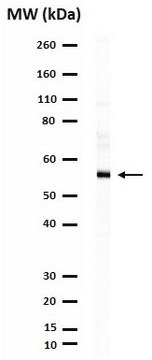MABC166
Anti-Angiogenin Antibody, clone 26–2F (Azide Free)
clone 26-2F, from mouse
Sinônimo(s):
Angiogenin, Ribonuclease 5, RNase 5
About This Item
Produtos recomendados
fonte biológica
mouse
Nível de qualidade
forma do anticorpo
purified antibody
tipo de produto de anticorpo
primary antibodies
clone
26-2F, monoclonal
reatividade de espécies
human
técnica(s)
immunocytochemistry: suitable
immunohistochemistry: suitable
inhibition assay: suitable
Isotipo
IgG1κ
nº de adesão NCBI
nº de adesão UniProt
Condições de expedição
wet ice
modificação pós-traducional do alvo
unmodified
Informações sobre genes
human ... ANG(283)
Descrição geral
Imunogênio
Aplicação
Inhibition Assay: A representative lot of this antibody inhibited ribonucleolytic activity (Piccoli et al., (1998) Proc. Natl. Acad. Sci. 95:4579–4583).
Immunohistochemistry Analysis: A representative lot of this antibody detected Angiogenin in Neovessels of cancer tissue (Tsuji et al., (2005) Cancer Res. 65:1352-1360).
Immunocytochemistry Analysis: A representative lot of this antibody detected Angiogenin in HeLa and Huvec cells (Tsuji et al., (2005) Cancer Res. 65:1352-1360).
Apoptosis & Cancer
Apoptosis - Additional
Qualidade
Immunocytochemistry Analysis: A 4 µg/mL of this antibody detected Angiogenin in Angiogenin-treated and untreated HeLa Cells. HeLa cells that were treated with Angiogenin up-took the protein and translocated it to the nucleus. Untreated HeLa cells did not exhibit any Angiogenin protein signal.
Descrição-alvo
forma física
Armazenamento e estabilidade
Handling Recommendations: Upon receipt and prior to removing the cap, centrifuge the vial and gently mix the solution. Aliquot into microcentrifuge tubes and store at -20°C. Avoid repeated freeze/thaw cycles, which may damage IgG and affect product performance.
Outras notas
Exoneração de responsabilidade
Não está encontrando o produto certo?
Experimente o nosso Ferramenta de seleção de produtos.
Código de classe de armazenamento
12 - Non Combustible Liquids
Classe de risco de água (WGK)
WGK 2
Ponto de fulgor (°F)
Not applicable
Ponto de fulgor (°C)
Not applicable
Certificados de análise (COA)
Busque Certificados de análise (COA) digitando o Número do Lote do produto. Os números de lote e remessa podem ser encontrados no rótulo de um produto após a palavra “Lot” ou “Batch”.
Já possui este produto?
Encontre a documentação dos produtos que você adquiriu recentemente na biblioteca de documentos.
Nossa equipe de cientistas tem experiência em todas as áreas de pesquisa, incluindo Life Sciences, ciência de materiais, síntese química, cromatografia, química analítica e muitas outras.
Entre em contato com a assistência técnica







